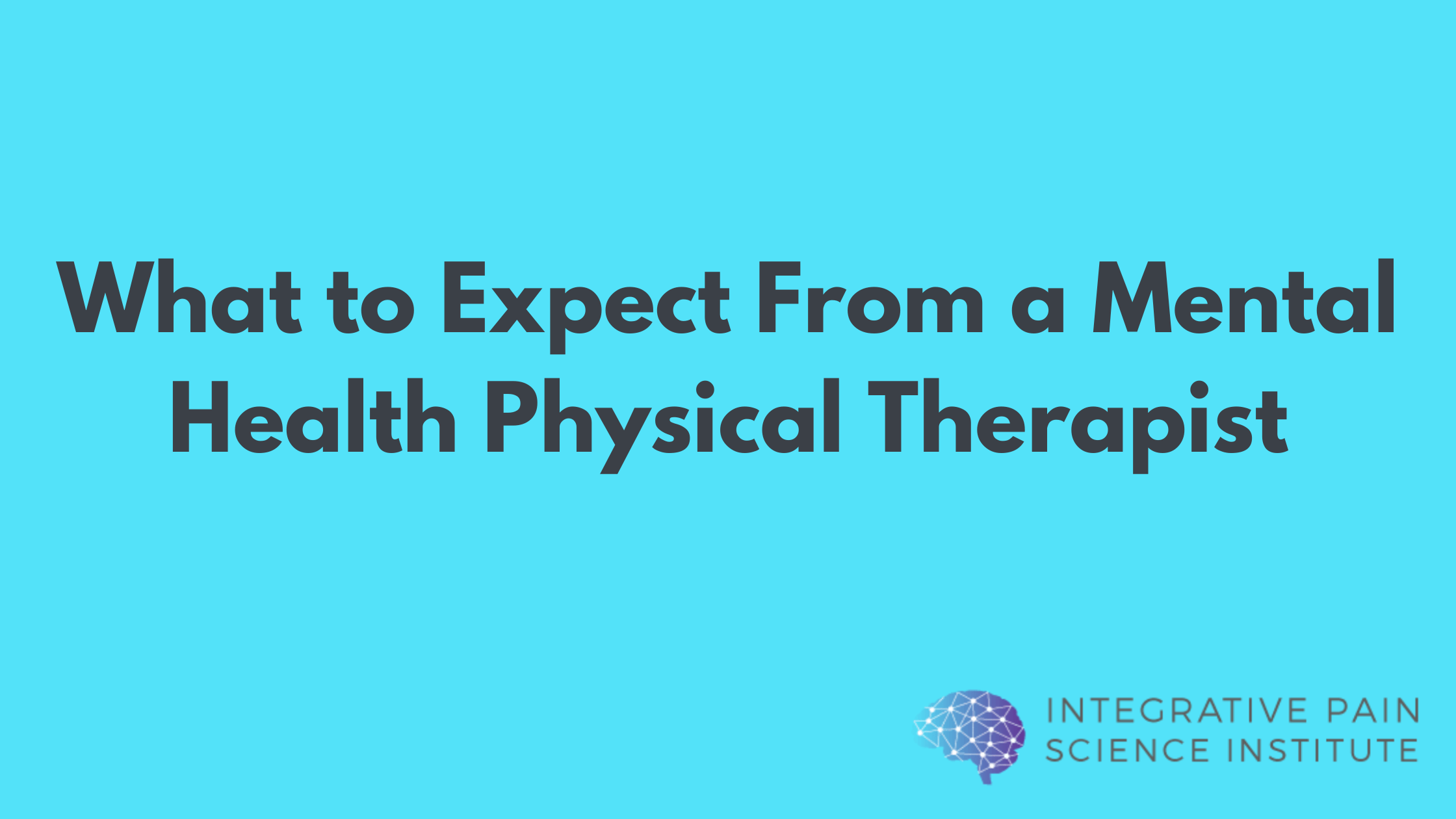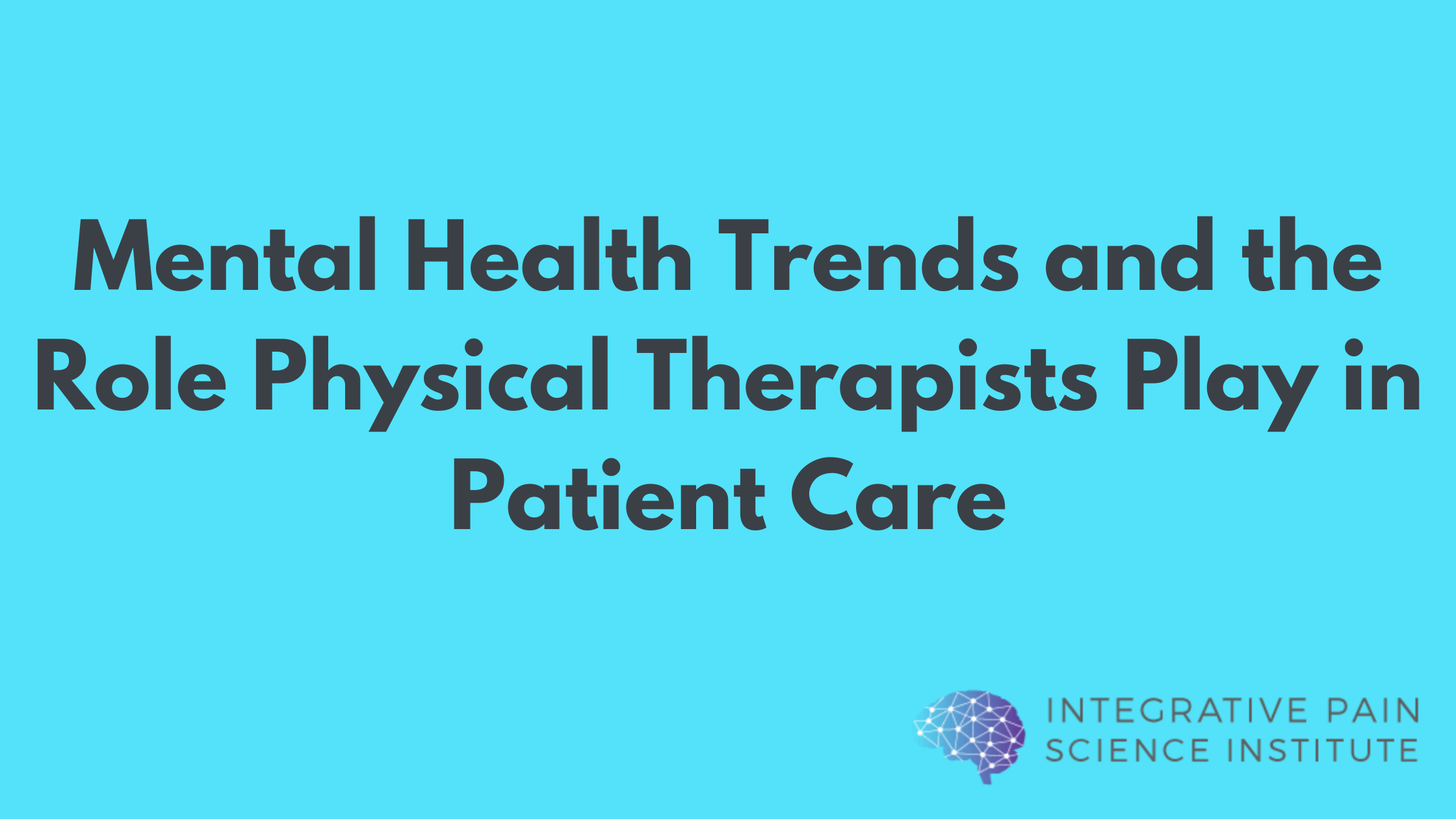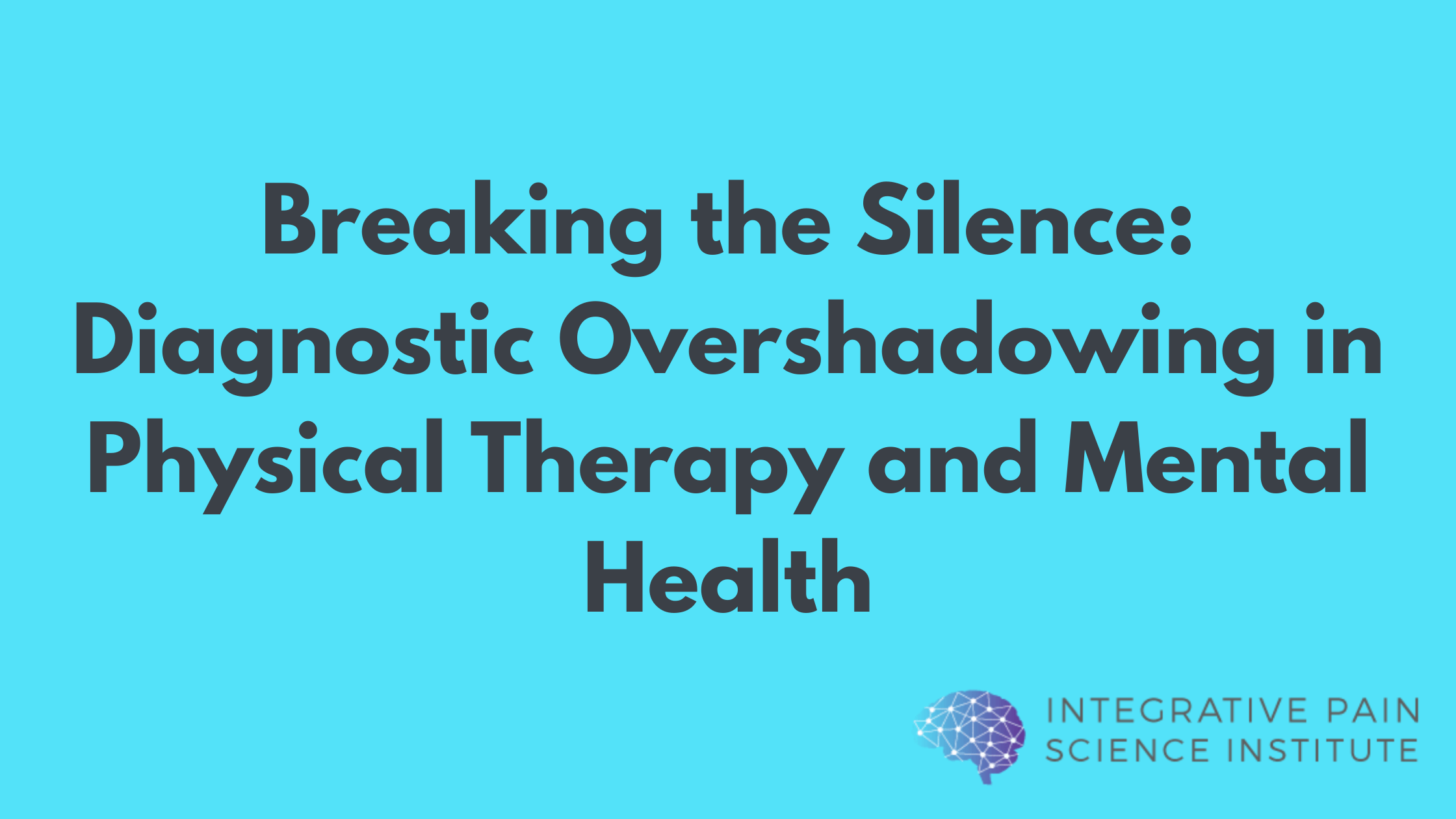In the wake of rising global mental health concerns and mental health provider shortages, the need for accessible, effective, and scalable interventions has never been more critical. Physical therapists can be used to address mental health.
Low-intensity psychological interventions have emerged as a cornerstone in addressing this need, offering a viable solution for individuals with mild to moderate mental health conditions. This blog post delves into the world of low-intensity psychological interventions, exploring their types, mechanisms, and the pivotal role they play in the broader mental health care landscape. This information may be of interest to physical therapists working in mental health.
For a comprehensive overview of the physical therapist’s role in mental health, refer to our earlier blog post, The Physical Therapist’s Role in Behavioral and Mental Health.
Introduction to Low-Intensity Psychological Interventions
Low-intensity psychological interventions are designed to provide early, accessible, and effective mental health support with minimal mental health professional involvement. These interventions stand in contrast to traditional, high-intensity psychological therapies, such as prolonged face-to-face sessions with a psychologist or psychiatrist, which require extensive time, resources, and specialized training.
This is important because the United States is facing a severe mental health shortage. According to the Research and Action Institute, a think tank of the Association of American Medical Colleges, an estimated 129.6 million people lived in one of the 5,930 federally designated mental health care Health Professional Shortage Areas. Less than one-third of the U.S. population (28%) lives in an area where there are enough mental health professionals available to meet the needs of the population — in fact, most states have fewer than 40% of the mental health professionals needed. The shortage and maldistribution of mental health professionals across the country further impede access to mental health care. Rural areas, where 14% of the U.S. population (or 46 million people) live, have disproportionately low numbers of practicing mental health professionals compared with urban areas.
The rationale behind low-intensity interventions is to make mental health care more accessible and to prevent the escalation of mild or moderate issues into more severe conditions. Typically targeting individuals with mild to moderate mental health issues, these interventions aim to provide a first line of defense against mental health challenges, promoting well-being and preventing the deterioration of mental health conditions.
Types and Examples of Low-Intensity Interventions for Physical Therapists
Low-intensity interventions come in various forms including individual and group therapy sessions, as well as guided self-help resources. They often include essential components of:
Motivational Interviewing (MI): A counseling approach that helps people find the internal motivation to change their behavior by exploring and resolving ambivalence. It’s characterized by collaboration, evocation, and respect for the individual’s autonomy.
Cognitive Behavioral Therapy (CBT): A treatment that helps individuals understand the thoughts and feelings that influence behaviors. CBT is commonly used to treat a wide range of disorders, including phobias, addiction, depression, and anxiety.
Acceptance and Commitment Therapy (ACT): A type of treatment that encourages individuals to accept their thoughts and feelings rather than fighting or feeling guilty for them. It focuses on commitment and behavior change strategies in the context of personal values.
Mindfulness-Based Approaches: These approaches involve practices that focus on being aware of what you’re sensing and feeling in the moment, without interpretation or judgment. Practices include meditation, mindfulness-based stress reduction (MBSR), and mindfulness-based cognitive therapy (MBCT).
Problem-Solving: A process that involves discovering, analyzing, and solving problems. The ultimate goal of problem-solving is to overcome obstacles and find a solution that best resolves the issue.
Trauma-Informed Care: An approach in the field of human services that assumes that an individual is more likely than not to have a history of trauma. It recognizes the presence of trauma symptoms and acknowledges the role trauma may play in an individual’s life- including service settings.
Relaxation Therapy: A broad range of techniques and therapeutic approaches that are designed to help people reduce tension and anxiety, improve their well-being, and manage stress. Techniques include deep breathing, progressive muscle relaxation, guided imagery, and meditation.
Health Behavior Change Principles and Interventions: This refers to the application of principles of behavior change to influence physical health outcomes. These interventions are designed to affect the actions individuals take regarding their health, including lifestyle adjustments, adherence to medical advice, and engagement in activities beneficial to health.
These approaches are often ‘transdiagnostic’ meaning they can broadly be applied to a variety of mental health conditions such as anxiety, depression, and PTSD/trauma. They view mental health conditions on a continuum where support is needed and resources are available. A range of mental well-being and having mental health conditions and/or mental illness at the two extreme ends. Depending on the circumstances of any individual at any time, they may find themselves at one point of the continuum and shift position as their situation improves or deteriorates.
Digital therapies, such as online Cognitive Behavioral Therapy (CBT) programs and mobile health apps, have gained prominence for their accessibility and scalability. For instance, CBT for depression and anxiety allows users to work through therapeutic content at their own pace, often accompanied by periodic check-ins with a healthcare provider. Mindfulness apps promote stress management and emotional regulation, providing users with techniques to enhance their mental well-being. Additionally, peer support groups offer a platform for individuals to share experiences and coping strategies, fostering a sense of community and mutual support.
Lifestyle-based interventions are often a component of low-intensity psychological interventions. Lifestyle can play a significant role in improving mental health. Lifestyle interventions focus on preventing, treating, and reversing mental health conditions by replacing unhealthy behaviors with positive ones. Here’s how different aspects of lifestyle medicine can affect mental health:
Nutrition: A diet rich in fruits, vegetables, whole grains, lean protein, and healthy fats has been associated with a lower risk of depression and anxiety. The Mediterranean diet, for example, has been linked to better mental health outcomes.
Physical Activity: Regular physical exercise can help reduce symptoms of depression and anxiety, improve mood, increase self-esteem, and enhance cognitive function.
Sleep Hygiene: Adequate, high-quality sleep is essential for mental health. Poor sleep can lead to emotional instability, cognitive deficits, and increased susceptibility to psychiatric disorders.
Stress Management: Techniques such as mindfulness, meditation, deep-breathing exercises, and yoga can reduce stress and anxiety.
Substance Avoidance: Avoiding tobacco, limiting alcohol intake, and abstaining from recreational drugs are important for mental wellness, as substance abuse can exacerbate or trigger mental health problems.
Social Connection: Building and maintaining social connections can help protect against mental health issues like depression and anxiety.
Outdoor Activities: Time spent in nature can have restorative effects on mental health, reducing stress and improving mood.
Mind-Body Connection: Practices that enhance the mind-body connection, such as tai chi, qi gong, and some forms of yoga, can improve mental health by reducing stress and inducing a state of relaxation.
Low-intensity interventions vary in length but are typically between 6-12 sessions long. The advantages of low-intensity interventions are that they are shorter and less time-intensive treatments that are cheaper and easier to integrate into primary and community healthcare settings, or within stepped-care models. This may increase access to mental health interventions for larger numbers of people in need of mental health care. The effectiveness of these interventions is supported by the World Health Association and a growing body of evidence, highlighting their potential to significantly improve mental health outcomes. Low-intensity psychosocial interventions reduce distress and improve mental health in populations subjected to adversities, according to systematic review and meta-analysis findings published in World Psychiatry.
Mechanisms of Action: How These Interventions Help Physical Therapists Improve Mental Health
The efficacy of low-intensity psychological interventions lies in their foundational theories and mechanisms of action. Cognitive-behavioral-based interventions, for example, aim to alter thought patterns and behaviors that contribute to mental health issues. Through structured exercises, individuals learn to identify and challenge negative thoughts, gradually developing healthier thinking patterns. Mindfulness-based interventions, on the other hand, focus on enhancing emotional regulation and stress resilience by promoting present-moment awareness and acceptance.
Self-efficacy and empowerment are central to the success of these interventions. By equipping individuals with the tools and knowledge to manage their mental health, these interventions foster a sense of control and agency. Tailoring these approaches to individual needs further enhances their effectiveness, allowing for a more personalized and relevant mental health care experience.
Mobilizing Physical Therapists to Use Low Psychological Interventions
A 2019 study in BMJ Open found that training non-specialist workers such as physical therapists in mental healthcare is an effective strategy to increase global provision and capacity, and improve knowledge, attitude, skill, and confidence among health workers, as well as clinical practice and patient outcomes.
Non-specialist workers in mental healthcare are individuals who provide support and care to people with mental health issues but do not have a specialized degree in mental health. Low-intensity psychological interventions are cost-effective, accessible solutions for treating depression and anxiety in patients with outcomes often equal to trained mental health providers.
Task-shifting and task-sharing fit well within the PTs scope of practice in mental health. These interventions delivered by non-specialist mental health workers might include:
Nurses
Physical therapists
Chiropractors
Community health workers
Peer support workers
Nursing assistants
Psychiatric aides
Home care aides
School teachers
Clergy
Family members
Lay substance use counselors (who do not have a specialized degree or training in mental health)
Editorial and point-of-view papers in the Journal of Physical Therapy and Rehabilitation (PTJ) has recommended using physical therapists to close the gap in depression care specifically. Integrating low-intensity psychological interventions into the practice of physical therapy presents a unique opportunity to screen for, triage, address, and mange the often-overlooked mental health aspects of physical health issues. Physical therapists, by virtue of their close and regular contact with patients, are in a prime position to recognize the signs of mental health struggles and to offer support through low-intensity interventions. When needed they can be key members of the interdisciplinary mental healthcare team. Educating physical therapists on these interventions can empower them to provide holistic care that addresses both the physical and mental aspects of health, ultimately leading to better overall outcomes for their patients.
Future Directions for Mental Health Physical Therapists
Despite the promise of low-intensity psychological interventions, challenges and limitations remain. These interventions may not be suitable for individuals with complex or severe mental health conditions who require more intensive and specialized care. Additionally, the risk of low engagement or dropout is a concern, as the less personalized nature of these interventions might not meet the needs or preferences of all users. A PT must also have keen differential diagnostic skills to ensure that individuals receive appropriate care and are referred to higher-intensity mental health services when necessary.
Looking ahead, the future of low-intensity psychological interventions is bright, with potential solutions to current challenges including the development of blended care models that combine low- and high-intensity interventions. Continued innovation, research, and the integration of these interventions into existing healthcare systems are essential to expand their accessibility and effectiveness. By doing so, we can move towards a future where mental health care is more inclusive, accessible, and tailored to the needs of individuals across the spectrum of mental health conditions.
Conclusion
Physical therapists can help close the gap in mental health care by employing low-moderate intensity psychological interventions.
As awareness of low-intensity psychological interventions grows, so too does the potential to transform the landscape of mental health care. By embracing these interventions, we can make strides towards a world where effective mental health support is within reach for everyone, regardless of their circumstances.




